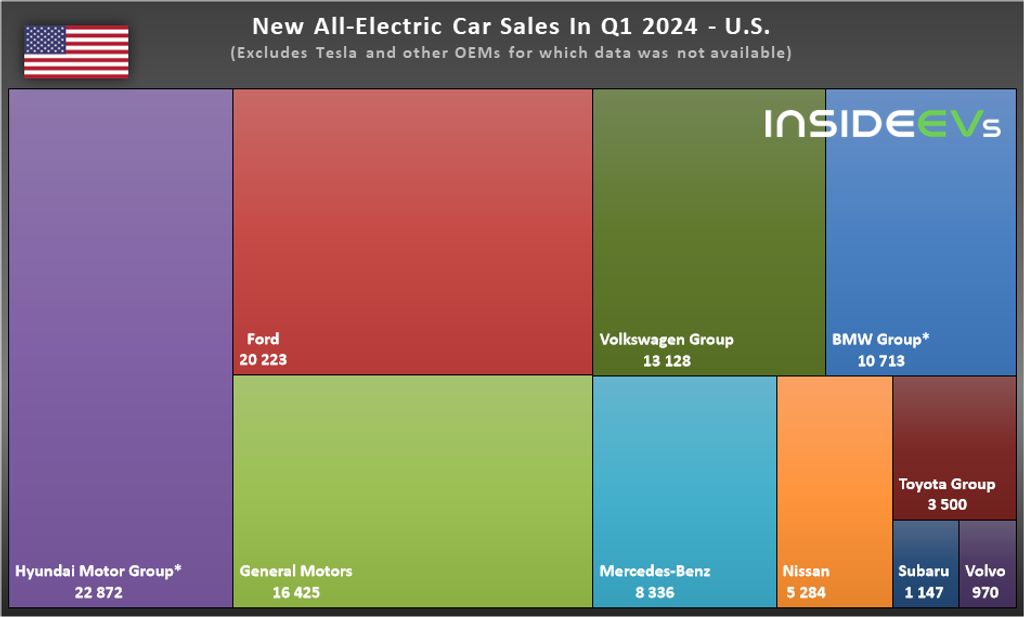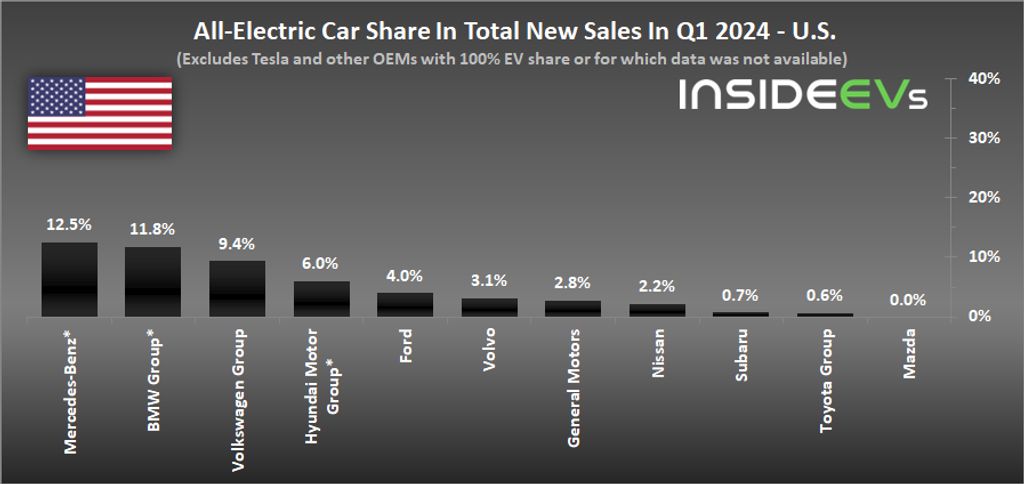Following our Q1 2024 all-electric car sales report for non-Tesla brands in the U.S., it’s time to take a look at the automotive group level. This will reveal which companies are selling the highest number of battery electric vehicles (EVs) and which are achieving the highest share of EVs out of their total sales volume.
The largest non-Tesla players usually are Hyundai Motor Group (the number one in 2023), Ford, General Motors and Volkswagen Group.
Traditional manufacturers have their own EV race
In 2023, sales of all-electric cars by traditional carmakers almost doubled year-over-year to well over 450,000. The Hyundai Motor Group, Ford and General Motors were among the top non-Tesla automotive groups in terms of EV sales volume.
This report includes 11 traditional manufacturers for which consistent data is available: BMW Group (BMW and Mini, but without data for the Mini Cooper SE model), Ford Group (Ford and Lincoln), General Motors (the BrightDrop delivery van division, Cadillac, Chevrolet, GMC), Hyundai Motor Group (Hyundai, but without data for the Hyundai Kona Electric model, Kia and Genesis), Mazda, Mercedes-Benz (excluding its van division), Nissan, Subaru, Toyota Group (Toyota and Lexus), Volkswagen Group (Volkswagen, Audi and Porsche) and Volvo.
Not all manufacturers report their sales results in the U.S., especially the newer companies like Tesla, Rivian, Polestar, Lucid, Fisker and VinFast. They do not break out sales by country or region so their figures can’t be included in this report. They are also 100% electric already.
EV Sales By Automotive Groups – Q1 2024
The listed 11 traditional automakers delivered more than 102,000 all-electric cars in Q1 2024 in the U.S., about 18% more than a year ago.
Last quarter, only two automotive groups (aside from Tesla) exceeded 20,000 units—Hyundai Motor Group with at least 22,872 and Ford with 20,223 units. In the case of Hyundai, we say “at least” because we don’t have the number for the Hyundai Kona Electric model (it’s counted together with the gas-powered Kona).
General Motors was third with 16,425 units sold, slightly ahead of the Volkswagen Group (13,128). The small club of manufacturers with 10,000+ units was completed by the BMW Group (10,713). We guess that Rivian potentially also sold more than 10,000 EVs during the quarter, as its global Q1 result was 13,588 and the U.S. is Rivian’s single-largest market but we can’t confirm that figure.
* Excludes Tesla and other companies for which data was not available
** Hyundai sales without the Hyundai Kona Electric model
*** BMW Group sales without the Mini Cooper SE
Overall, 2024 will be a close race between Hyundai Motor Group, Ford and General Motors (if the ramp-up of Ultium models progresses). The competition might be especially challenging because increasing volume (or even maintaining previous levels) often requires price cuts or deep rebates/leasing incentives.
Meanwhile, in Q4, the highest EV share was achieved by German manufacturers: the Mercedes-Benz brand (excluding vans) at 12.5%, followed by the BMW Group (at least 12.8%) and Volkswagen Group (9.4%).
Let’s note that at least for now, this metric remains a bit skewed. Not all brands within particular groups even offer EVs, which lowers the average of the large groups compared to single-brand automakers.
Hyundai Motor Group improved its EV share to at least 6.0% (compared to the 5.2% average in 2023). The same concerns Ford at 4.0% (up from 3.6% average in 2023). GM’s position is relatively stable under 3%.
Volvo noted the biggest drop, from 10.6% in 12 months of 2023 to just 3.1% in Q1 2024. That’s because the company awaits the arrival of the new Volvo EX30 and Volvo EX90 models.
* Excludes Tesla and other OEMs for which data was not available
** Hyundai sales without the Hyundai Kona Electric model
*** BMW Group sales without the Mini Cooper SE
**** Mercedes-Benz (excluding vans)
For reference, the U.S. average EV share for traditional brands might be estimated at over 3% (assuming roughly 7% average EV market share, when including Tesla and other electric-only brands).
Starting in Q2, things will become even more interesting as Stellantis will enter the EV segment with several all-electric models. This will increase the total non-Tesla EV sales to outnumber Tesla.



